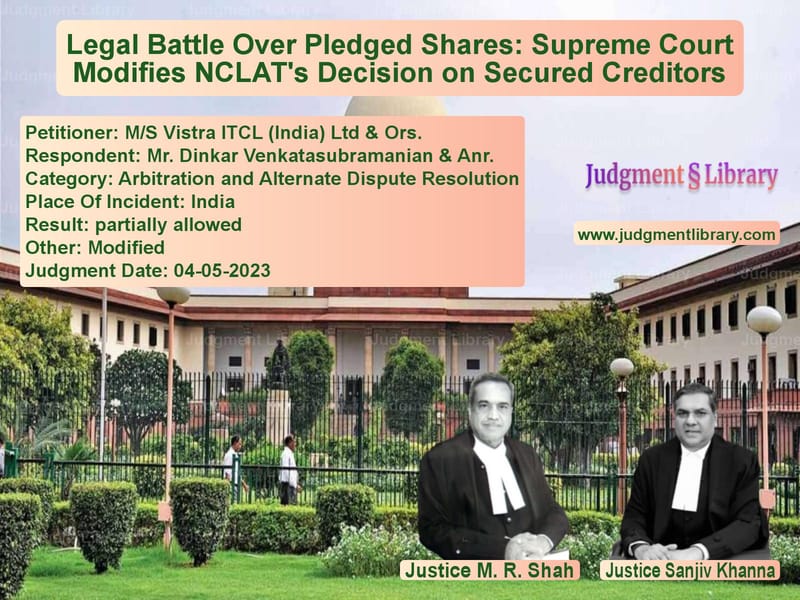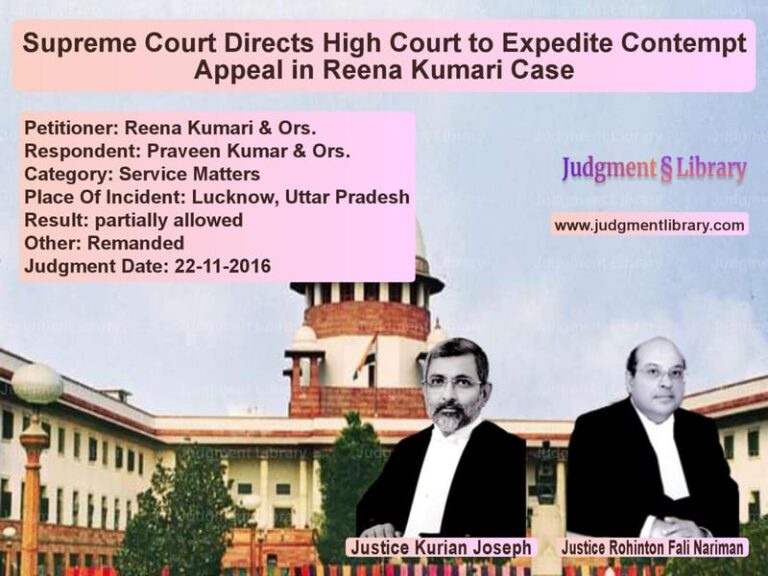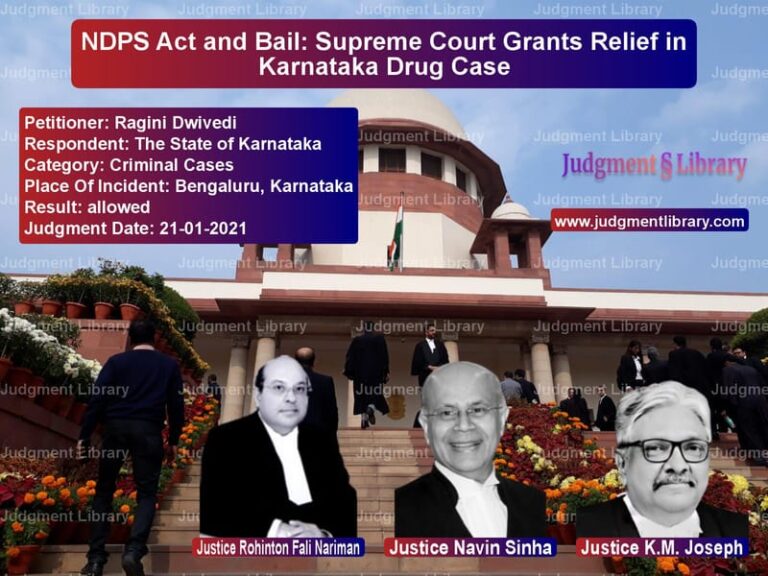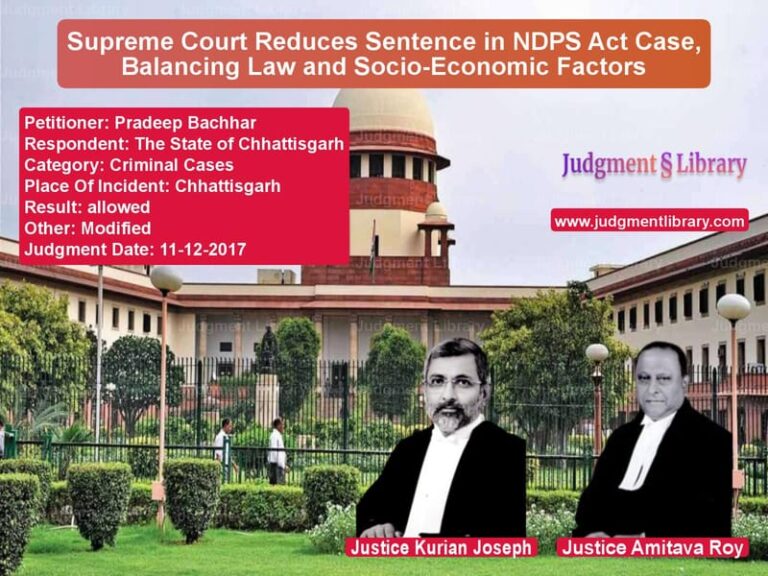Legal Battle Over Pledged Shares: Supreme Court Modifies NCLAT’s Decision on Secured Creditors
The case of M/S Vistra ITCL (India) Ltd & Ors. vs. Mr. Dinkar Venkatasubramanian & Anr. is a significant ruling in the realm of insolvency and bankruptcy law in India. The Supreme Court of India dealt with the issue of whether Vistra ITCL (India) Ltd., which held pledged shares as security, could be classified as a financial creditor under the Insolvency and Bankruptcy Code (IBC), 2016. This case underscores the rights of secured creditors in insolvency proceedings and the limitations imposed by the classification system under the IBC.
The dispute arose when Vistra ITCL, acting as a security trustee, sought recognition as a financial creditor in the insolvency resolution process of Amtek Auto Limited (Corporate Debtor). The claim was dismissed by the National Company Law Tribunal (NCLT) and later by the National Company Law Appellate Tribunal (NCLAT), leading to the present appeal before the Supreme Court.
Background of the Case
Amtek Auto Limited, a corporate entity in financial distress, had secured a short-term loan facility of INR 500 crores through its group companies, Brassco Engineers Ltd. and WLD Investments Pvt. Ltd. This loan was backed by a pledge of 66.77% of its shareholding in JMT Auto Ltd. Vistra ITCL was appointed as the security trustee for these pledged shares.
Subsequently, an application under Section 7 of the IBC was admitted against Amtek Auto Limited in 2017, and Mr. Dinkar T. Venkatasubramanian was appointed as the interim resolution professional. As part of the resolution process, Vistra ITCL filed a claim asserting its status as a secured financial creditor. However, the resolution professional rejected this claim, stating that Vistra ITCL had not directly lent money to the Corporate Debtor.
Petitioner’s Arguments
Vistra ITCL, represented by Senior Advocate Rakesh Dwivedi, contended that its claim as a secured financial creditor was legitimate. The primary arguments advanced by the petitioner were:
- The pledge of shares constituted a security interest under Section 3(31) of the IBC, and therefore, the petitioner should be recognized as a secured creditor.
- The resolution professional erred in rejecting its claim without considering the nature of the financial transaction, which was structured for the benefit of the Corporate Debtor.
- The NCLAT’s decision to dismiss the appeal on the grounds of delay was incorrect as the claim was based on a continuing cause of action.
- The classification of creditors under the IBC should not lead to the denial of legitimate security interests held by financial entities.
Respondents’ Arguments
Solicitor General Tushar Mehta, representing the Committee of Creditors (CoC), countered the petitioner’s arguments with the following points:
- The claim filed by Vistra ITCL had been rejected in 2017, and the petitioner did not challenge this decision at that time.
- Under IBC, the status of a financial creditor is based on the direct lending of money, and since Vistra ITCL had not advanced funds to the Corporate Debtor, it could not be classified as a financial creditor.
- Decisions in Anuj Jain vs. Axis Bank and Phoenix ARC vs. Ketulbhai Patel clearly established that a mere pledge of shares does not create a financial debt.
- Allowing the claim at this stage would disrupt the insolvency resolution process, which had already undergone significant delays.
Supreme Court’s Observations
The Supreme Court examined the legal framework governing financial creditors and secured creditors under the IBC. Key observations made by the Court included:
- Vistra ITCL was indeed a secured creditor as per the definition in Section 3(31) of the IBC, which includes pledging of shares as a security interest.
- However, to qualify as a financial creditor, the entity must have directly advanced money to the Corporate Debtor, which Vistra ITCL had not done.
- The decisions in Anuj Jain vs. Axis Bank and Phoenix ARC vs. Ketulbhai Patel were applicable, reinforcing that the mere holding of pledged shares does not equate to being a financial creditor.
- Nevertheless, the Court recognized that excluding Vistra ITCL from the insolvency process entirely would leave it without remedies, which would be an unfair outcome.
Final Judgment
The Supreme Court modified the decision of the NCLAT. While it upheld the ruling that Vistra ITCL could not be classified as a financial creditor, it directed that Vistra ITCL should retain its rights as a secured creditor under Sections 52 and 53 of the IBC.
As part of this ruling, the resolution applicant, Deccan Value Investors (DVI), was given two options:
- Recognize Vistra ITCL as a secured creditor, allowing it to enforce its security interest in the pledged shares.
- Provide Vistra ITCL with equivalent monetary compensation through the resolution plan.
Impact of the Judgment
This ruling clarifies the legal standing of secured creditors holding pledged shares in insolvency proceedings. Key takeaways from the judgment include:
- A secured creditor holding pledged shares does not automatically qualify as a financial creditor under the IBC.
- Such creditors, however, must be given the opportunity to enforce their security interest or be adequately compensated.
- The judgment reinforces the principle that classification under the IBC should not lead to unfair treatment of legitimate security interests.
- Resolution professionals and CoCs must carefully evaluate claims from secured creditors to ensure equitable treatment in insolvency proceedings.
Conclusion
The Supreme Court’s ruling in this case strikes a balance between protecting the rights of secured creditors and maintaining the integrity of the insolvency resolution process. By ensuring that Vistra ITCL retains its rights over the pledged shares, the Court has reinforced the importance of security interests while adhering to the classification principles under the IBC.
This judgment will serve as a guiding precedent for future cases involving pledged shares and secured creditors, providing much-needed clarity on their legal standing in insolvency proceedings.
Petitioner Name: M/S Vistra ITCL (India) Ltd & Ors..Respondent Name: Mr. Dinkar Venkatasubramanian & Anr..Judgment By: Justice M. R. Shah, Justice Sanjiv Khanna.Place Of Incident: India.Judgment Date: 04-05-2023.
Don’t miss out on the full details! Download the complete judgment in PDF format below and gain valuable insights instantly!
Download Judgment: ms-vistra-itcl-(ind-vs-mr.-dinkar-venkatasu-supreme-court-of-india-judgment-dated-04-05-2023.pdf
Directly Download Judgment: Directly download this Judgment
See all petitions in Arbitration Awards
See all petitions in Dispute Resolution Mechanisms
See all petitions in Arbitration Act
See all petitions in Enforcement of Awards
See all petitions in Judgment by Mukeshkumar Rasikbhai Shah
See all petitions in Judgment by Sanjiv Khanna
See all petitions in partially allowed
See all petitions in Modified
See all petitions in supreme court of India judgments May 2023
See all petitions in 2023 judgments
See all posts in Arbitration and Alternate Dispute Resolution Category
See all allowed petitions in Arbitration and Alternate Dispute Resolution Category
See all Dismissed petitions in Arbitration and Alternate Dispute Resolution Category
See all partially allowed petitions in Arbitration and Alternate Dispute Resolution Category







